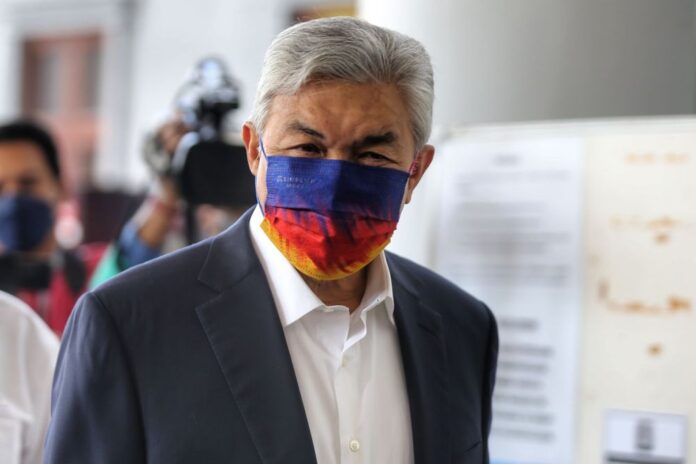Datuk Seri Ahmad Zahid Hamidi is pictured at Kuala Lumpur High Court October 4, 2021. — Picture by Ahmad Zamzahuri
KUALA LUMPUR, Oct 4 — The prosecution today insisted that a businessman’s cheques, totalling RM5 million and personally handed over to Datuk Seri Ahmad Zahid Hamidi as purported donations were actually money corruptly received by him, and that the subsequent use of this money for a mosque project does not make it legal.
Today, the prosecution was presenting its arguments in the High Court on why former home minister Ahmad Zahid should be called to enter defence and explain himself against eight corruption charges.
Deputy public prosecutor Gan Peng Kun zoomed in on 10 cheques totalling RM5 million which were issued by textile wholesaler Junaith Asharab Md Shariff via his company Berani & Jujur Trading, and which this businessman had passed to Ahmad Zahid in the latter’s house in 2017.
Junaith Asharab had previously as the 36th prosecution witness told the court that he had intended the RM5 million to be a donation for a mosque and a tahfiz school in Bagan Datuk, and that there was initially no recipient named for all 10 cheques but that he was later told by Ahmad Zahid to name law firm Lewis & Co as the recipient.
Gan noted that Ahmad Zahid’s lawyers had recently highlighted that the law firm Lewis & Co’s partner Muralidharan Balan Pillai had confirmed using the 10 cheques totalling RM5 million to pay Noble Energy, which was the contractor for mosque construction.
Gan however pointed out that the corruption charge that Ahmad Zahid is facing is only related to the reason for why the money was allegedly corruptly received, and is not about what this money was later used for.
“We submit, the ends do not justify the means. The purpose the accused (Ahmad Zahid) received the 10 cheques from Junaith cannot be legalised by the fact that they were subsequently used to pay the contractor of the mosque,” Gan told the court today.
In order for the prosecution to prove the corruption charge involving the RM5 million against Ahmad Zahid, Gan said the prosecution does not need to prove how the alleged bribe received by Ahmad Zahid was spent, but instead needs to prove that he had received these 10 cheques as an inducement for him to help Junaith Asharab-linked Mastoro Kenny IT Consultant & Services to get MyEG projects.
This due to there being only three elements for this corruption charge under Section 16(a)(B) of the Malaysian Anti-Corruption Commission Act that the prosecution needs to prove, namely the accused is an officer of a public body in his capacity, that the accused corruptly received gratification for himself, and that the gratification was received as inducement to do anything in relation to a matter or transaction — either actual or proposed or likely to take place — in which the public body is concerned.
Can the witness be trusted about alleged post-GE14 project promise?
Previously, Junaith Asharab had told the court that Ahmad Zahid had promised to award him MyEG projects worth RM50 million after the 14th general election at the same time after the cheques were handed over, and that Ahmad Zahid had asked him to send in proposals for the “promised MyEG project” after the 14th general elections.
Today, Gan said that Junaith Asharab’s testimony about the alleged projects promised by Ahmad Zahid could be considered to be credible.
Gan noted that Junaith Asharab had previously told the court that he had asked his former schoolmate M. Kumaraguru M. Muthusamy to register the company Mastoro Kenny with the Companies Commission of Malaysia to carry out the MyEG project allegedly promised by Ahmad Zahid.
Kumaraguru had previously confirmed in court that he had set up Mastoro Kenny in 2016 on Junaith Asharab’s request as the latter claimed to be able to obtain projects from public-listed firm MyEG Services Bhd, but said the company never received any projects from anyone since its 2016 formation until its closure.
Today, Gan noted that the Companies Commission of Malaysia’s records show that Mastoro Kenny was registered in August 2016 but that its registration was left to expire a year later and not renewed, while two other related businesses which had issued cheques given to Ahmad Zahid — Junaith Asharab’s Berani & Jujur Trading and Kumaraguru’s Jogabonito Jewellery & Diamonds — remained active as they were “genuine businesses” run by the Junaith Asharab and Kumaraguru respectively.
“This goes to show Mastoro Kenny was set up only to receive the MyEG projects as stated by Junaith,” Gan said, when arguing that this was one of the reasons why Junaith Asharab’s court testimony on the alleged project promise by Ahmad Zahid can be “accepted as the truth”.
Junaith Asharab previously told the court that he had given a RM250,000 cheque by Jogabonito to Ahmad Zahid’s younger brother Datuk Seri Mohamad Nasaee Ahmad Tarmizi in 2016 as a loan which the latter repaid, and that he had in 2016 handed over 13 cheques totalling RM8 million issued by Mastoro Kenny and in 2017 handed over 10 cheques totalling RM5 million from Berani & Jujur to Ahmad Zahid in the latter’s residence for the purpose of donating for a mosque and a tahfiz school in Bagan Datuk.
These three amounts are the basis for three out of eight corruption charges that Ahmad Zahid is currently facing.
In this trial, Ahmad Zahid — who is the current Umno president and former deputy prime minister — is facing 47 charges, namely 12 counts of criminal breach of trust in relation to charitable foundation Yayasan Akalbudi’s funds, 27 counts of money laundering, and eight counts of bribery charges.
The trial before High Court judge Datuk Collin Lawrence Sequerah resumes tomorrow.
MORE TO COME



